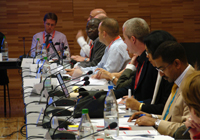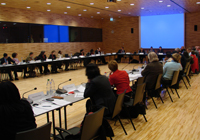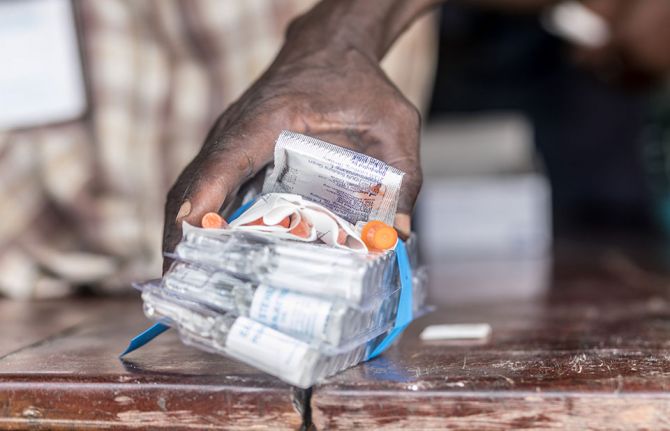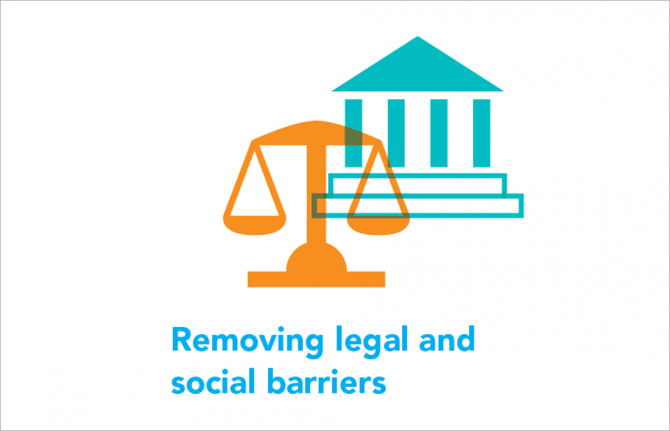
Feature Story
HIV-related travel restrictions
04 March 2008
04 March 2008 04 March 2008Since the beginning of the HIV epidemic, governments and the private sector have implemented travel restrictions with regard to HIV positive people wishing to enter or remain in a country for a short stay (e.g. business, personal visits, tourism) or for longer periods (e.g. asylum, employment, immigration, refugee resettlement, or study).

The international task team on HIV-relate
travel restrictions met for the first time in
Geneva on 25-26 February. The meeting
was co-chaired by UNAIDS and the
Government of Norway.
UNAIDS has set up an international task team to heighten attention to the issue of HIV-related travel restrictions (both short-term and long-term) on international and national agendas and move towards their elimination.
The international task team met for the first time in Geneva on 25-26 February. The meeting, co-chaired by UNAIDS and the Government of Norway, brought together representatives of governments, inter-governmental organizations and civil society, including the private sector and networks of people living with HIV.
According to data collected by the European AIDS Treatment Group, a total of 74 countries have some form of HIV-specific travel restrictions, 12 of which ban HIV positive people from entering for any reason or length of time. The most common reasons used are to protect public health and to avoid possible costs associated with care, support and treatment of people living with HIV.
Whatever the reason, HIV-related travel restrictions raise fundamental issues regarding the human rights of non-discrimination and freedom of movement of people living with HIV in today’s highly mobile world.
In the year 2000, the World Tourist Organization estimated that there were 698 million international arrivals world-wide. The majority of these people are travelling for short periods of time, e.g. for tourism, business, conferences, family visits. With regard to longer-term mobility, the International Organization for Migration (IOM) estimates that some 175 million migrants currently live and work outside their country of citizenship, i.e., 2.9 per cent of the world’s population.
HIV -related travel restrictions usually take the form of a law or administrative instruction that requires people to indicate their HIV-free status before entering or remaining in a country. Some countries require people to undergo an HIV test whereas others require an HIV-free certificate or simply that people declare their HIV status.
Testing under such circumstances is akin to mandatory testing, and in many instances is done without appropriate pre and post-test counselling or safeguards of confidentiality. Any HIV testing should be done voluntarily and on the basis of informed consent.
The personal impact of HIV-related travel restrictions can be devastating for the individual seeking to immigrate, to gain asylum, to visit family, to attend meetings, to study, or to do business. The candidate immigrant, refugee, student or other traveller may simultaneously learn that s/he is infected with HIV, that s/he may not be allowed to travel, and possibly that his/her status has become known to government officials, or to family, community, and employer, exposing the individual to possibly serious discrimination and stigma.
For those already in a receiving country, they may face summary deportation without due process of law and protection of confidentiality. Under such circumstances, there is every incentive to hide or deny one’s HIV status and to avoid contact with immigration authorities and health care workers. Both immigration controls and public health efforts are thereby undermined, while individuals are cut off from prevention, assistance and, perhaps, needed health services.

“Travel restrictions based on HIV status
again highlight the exceptionality of AIDS,
especially short-term restrictions," said
UNAIDS Executive Director Dr Peter Piot.
“Travel restrictions based on HIV status again highlight the exceptionality of AIDS, especially short-term restrictions," said UNAIDS Executive Director Dr Peter Piot. "No other condition prevents people from entering countries for business, tourism, or to attend meetings. No other condition has people afraid of having their baggage searched for medication at the border, with the result that they are denied entry or worse, detained and then deported back to their country", he added.
While recognizing that control of a country’s borders and matters of immigration fall under the sovereign power of individual States, national laws and regulations should ensure that people living with HIV are not discriminated against in their ability to participate equally in international travel, in seeking entry or stay in a country that is not their own. The International Guidelines on HIV/AIDS and Human Rights state that any restriction on liberty of movement or choice of residence based on suspected or real HIV status alone, including HIV screening of international travellers, is discriminatory.
Besides being discriminatory, travel restrictions have no public health justification. HIV should not be considered to be a condition that poses a threat to public health in relation to travel because, although it is infectious, the human immunodeficiency virus cannot be transmitted by the mere presence of a person with HIV in a country or by casual contact.
Restrictive measures can in fact run counter to public health interests, since exclusion of HIV-positive non-nationals adds to the climate of stigma and discrimination against people living with HIV, and may thus deter nationals and non-nationals alike from coming forward to utilize HIV prevention and care services. Moreover, travel restrictions may encourage nationals to consider HIV a “foreign problem” that has been dealt with by keeping foreigners outside their borders, so that they feel no need to engage in safe behaviour themselves.
Travel restrictions do not have an economic justification either. People living with HIV can now lead long and productive working lives, a fact that modifies the economic argument underlying blanket restrictions: concern about migrants’ drain on health resources must be weighed with their potential contribution. Furthermore, the continued expansion of treatment programmes towards Universal Access by 2010, and the sustained fall in the cost of treatment in low- and middle-income countries dispels the myth that the travel of a HIV positive person would drive up the cost of health care systems abroad.
The creation of an International Task Team on HIV-related Travel Restrictions is a critical opportunity to heighten attention to the issue of HIV-related travel restrictions on international and national agendas and move toward their elimination.
Developing Specific Recommendations for Positive Change

The Task Team will generate concrete
recommendations on specific actions that
different stakeholders can take to move
towards the elimination of HIV-related
travel restrictions.
The International Task Team comprises two working groups which focus on short-term and long-term restrictions, supported and guided by a Steering Committee. The Working Groups and the Steering Committee of the Task Team will meet four times before August 2008, when its final recommendations will be presented at the International AIDS Conference in Mexico. The Task Team will generate concrete recommendations on specific actions that different stakeholders (government, civil society, intergovernmental organizations and the private sector) can take to move towards the elimination of HIV-related travel restrictions. The Task Team will focus on key strategic actions that:
- Increase attention to the issue of HIV travel restrictions internationally, regionally and nationally
- Influence governments that have HIV-related travel restrictions relating to entry and short-term stay to remove such restrictions; and
- Spur longer term action to move towards the elimination of all HIV-specific travel restrictions.
In developing these recommendations, the Steering Committee will be supported by the Working Groups which will be requested to undertake:
- A critical mapping of the current situation related to the use of short-term and long-term HIV-related travel restrictions
- An analysis of the obstacles to eliminating the different types of HIV-related travel restrictions and possible actions by various national and international stakeholders to support this elimination, and
- Recommendations on best practice regarding the entry and stay of people living with HIV in different contexts of mobility and migration.
Recommendations will support the principles of non-discrimination and the Greater Involvement of People Living with HIV and rational HIV-related policies for travellers, migrants and mobile populations in sending and receiving countries – in the context of efforts to achieve universal access to HIV prevention, treatment, care and support, as agreed by governments at the High Level Meeting on AIDS (2006).
The International Task Team on HIV-related Travel Restrictions will hold its next meeting on 31st March – 2nd April in Geneva.
HIV-related travel restrictions
Feature stories:
Read about the second meeting of the International Task Team on HIV-Related Travel Restrictions (OHCHR web site)
External links:
Global Fund 16th Board Meeting – Acknowledgement of the UNAIDS Commitment to Create a Task Team on Travel Restrictions
IAS Policy Statement
European AIDS Treatment Group
Multimedia:
Listen to Shaun Mellors, Senior Technical Adviser, Human Rights, International HIV/AIDS Alliance
Listen to Gracia Violeta Ross Quiroga, National Chair, Bolivian Network of People with HIV/AIDS



